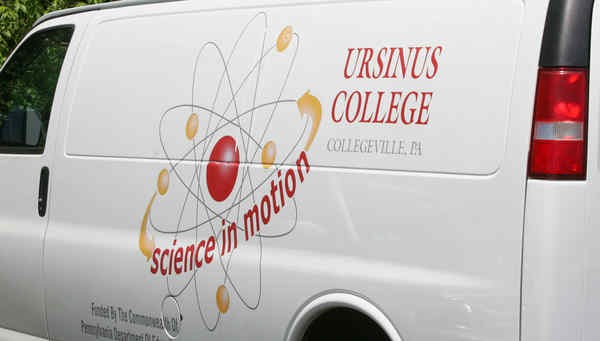Mobile science program brings high-tech gear to schools
It was a "Wow!" moment - literally.
As seventh grader Sidhartha Bhuyan turned a dial on the side of a digital microscope, the beating heart of a live daphnia, a tiny crustacean, pulsed into focus on a laptop computer screen.
"Wow!" Bhuyan called out. "Awesome!"
The reaction of the student at Arcola Intermediate School in Montgomery County's Methacton School District is the kind that makes a teacher's day and might jump-start a longer-term interest in science.
The moment came courtesy of Science in Motion, a respected but often-imperiled mobile science program that brings expensive equipment and knowledgable instructors to schools around the state.
This week, hundreds of seventh graders at Arcola have been learning to use digital microscopes, taking pictures of tiny organisms and printing them out at the end of class. Ron Faust, a Science in Motion biology educator based at Ursinus College, oversaw each lesson.
Having students get their hands on the same kind of equipment used in college labs and industry is "unbelievable," Arcola seventh-grade science teacher Peggy Greene said. "It definitely encourages the students to see that the microscope is a tool that can be exciting in learning science. . . . It makes them consider science as a real career opportunity or a real passion."
Students agreed. "It's a good learning experience," seventh grader Hannah O'Neill said. "It's really great to use this cool piece of technology."
The Science in Motion premise is simple: Schools often can't afford state-of-the-art scientific gear, costing thousands of dollars, that might be used only sporadically. Science in Motion buys the equipment and supplies,
As seventh grader Sidhartha Bhuyan turned a dial on the side of a digital microscope, the beating heart of a live daphnia, a tiny crustacean, pulsed into focus on a laptop computer screen.
"Wow!" Bhuyan called out. "Awesome!"
The reaction of the student at Arcola Intermediate School in Montgomery County's Methacton School District is the kind that makes a teacher's day and might jump-start a longer-term interest in science.
The moment came courtesy of Science in Motion, a respected but often-imperiled mobile science program that brings expensive equipment and knowledgable instructors to schools around the state.
This week, hundreds of seventh graders at Arcola have been learning to use digital microscopes, taking pictures of tiny organisms and printing them out at the end of class. Ron Faust, a Science in Motion biology educator based at Ursinus College, oversaw each lesson.
Having students get their hands on the same kind of equipment used in college labs and industry is "unbelievable," Arcola seventh-grade science teacher Peggy Greene said. "It definitely encourages the students to see that the microscope is a tool that can be exciting in learning science. . . . It makes them consider science as a real career opportunity or a real passion."
Students agreed. "It's a good learning experience," seventh grader Hannah O'Neill said. "It's really great to use this cool piece of technology."
The Science in Motion premise is simple: Schools often can't afford state-of-the-art scientific gear, costing thousands of dollars, that might be used only sporadically. Science in Motion buys the equipment and supplies,



